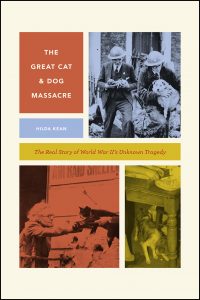Colin Dickey on Hilda Kean’s The Great Cat and Dog Massacre

After the jump: an excerpt from Colin Dickey’s review of Hilda Kean’s The Great Cat and Dog Massacre, at the Los Angeles Review of Books.
***
Pets were like members of the family, and it is here that the real truth of the matter may emerge. In the run-up to the war, many parents spoke candidly of how they would poison their own children rather than force them to live under German occupation. “I have been collecting poisons for some time with guile and cunning,” one housewife reported to the social research project Mass-Observation. “I have sufficient to give self, husband and all the children a lethal dose. I can remember the last war. I don’t want to live through another, or the children either. I shan’t tell them, I shall just do it.” Her sentiment was echoed by numerous others in Britain that summer before the war. “I’d rather see my two boys dead,” a 45-year-old father said. “I’d poison them if I thought it was coming.”
When war came, however, no mass murders of children took place. Instead, it appears, many people sublimated this impulse toward mercy killing by exercising it on their animals instead. The mass poisoning of children, however charitably intentioned, would have heralded a breakdown in human civilization the likes of which British may not have recovered from. Not so with the euthanizing of pets, which could be justified as both an economic sacrifice in hard times and a way of sparing a beloved creature unnecessary suffering.
The curious moral logic at work here, which saw the euthanization of animals as a kind of substitute for the prevention of human agony, extended to the field of battle as well as the home front. A British soldier fighting at Dunkirk remembered seeing “horses and carts blown sky high, it was terrible. I remembering seeing people mutilated, blown to pieces.” But while the people were beyond help, “[w]e could do something about the animals. We saw a horse that had its guts blown open, and we could shoot it. But there was nothing we could do about the human beings. We couldn’t stop and give first aid.” Unlike humans, suffering animals can be taken care of “humanely”: one group of creatures could be put out of their misery, the other could not.
Like the deer substituted for Iphigenia at the moment of her sacrifice, London’s pets were sacrificed in lieu of its children so that Londoners could satisfy their desire for mercy. And it was precisely pets’ liminal status, halfway between the world of nature and the world of humanity, that put their lives at greatest risk. Unlike more utilitarian beasts who were regarded as little more than tools or sources of food, domestic animals could act as outlets for human empathy, yet their lives were still expendable enough to end without compunction.
***
To read more about The Great Cat and Dog Massacre, click here.
To read Dickey’s review in full, click here.